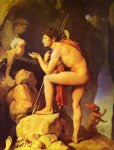It is a mania shared by philosophers of all ages to deny what exists and to explain what does not exist. -- Jean Jacques RousseauOur friends in the neurosciences have done much. Their new machines allow them to look at brains in distress, brains at rest, and even brains conjoined in congress. They have looked at the mind of contemplative monks and nuns, they say, although they have really only seen the brain, and they have looked at the mad and bad alike. They have long known that tumors explain religious mania.
In fact, there is a sort of belief lurking in a lot of science that extraordinary spirituality must have a physical analog, at best, or an aberrant physiology to explain it, at worst. Such theories may explain Benedict Joseph Labre, but they may not, too. The few cases of documented religious visionaries who were "cured" by electro-shock therapy or surgery is just another sneaking insult woven into the discussion of religious experience. It's ok. We religious are accustomed to being suspect.
However, it seems to me that this very insult, this very flail used against religion, is a confirmation of it. If there is a part of the brain that says, "This is the voice of the divine," then doesn't that mean that the experience of the supernatural is natural? In other words, if every brain has a receptor for religious experience, doesn't that prove, for once and all, that religious experience is part of the very condition of having a human brain? Doesn't it make the people who deny any possibility of such expression or experience ... well... weird? Doesn't it make them as unnatural as a person who refuses to eat carbohydrates or protein?

Still, I don't mean to offer a lashing to those who are aspiritual. They have my peace and best wishes. I have always hoped that they would stop trying to beat me with this stick, but it's not a big deal if people want to think that my brain is disordered. It probably is.
However, here is the thing that occurred to me today, the thing that has me puzzled. If there are tumors, microadenomas, and brain injuries that can result in people having delusional experiences of the divine, then is it possible that there are similar things that can prevent people from hearing the legitimate religious stimulus? If so, why are we not studying this?
I would advocate only one thing: we change our definition of the human from a creature who apprehends and experiences only natural stimulus to a creature whose normal and healthy operation involves the real or experiential apprehension and experience of the supernatural. In other words, if we look at a person who says that he has never felt that there is anything grander or greater than the natural world and say that this is aberrant, rather than looking at the person who sees "heaven in a grain of sand" and saying that that is a malady, would we not be likely to seek out the conditions that stifle such experience? I do not say that my version of religious intuition or experience is normal, but, when I look through history and mankind from China to Peru, I see people experiencing something.
Perhaps we can turn this stick to a lever. Perhaps we can even prise open our framing metaphors for life.


